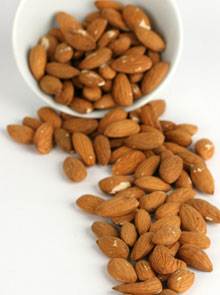Any foods can cause an allergic reaction, which is when the immune system overreacts, but allergies to nuts and especially peanuts can be lethal.
Unfortunately, nuts are found in a whole range of foods, and in those who are severely allergic, even a kiss from someone who has eaten a nut can cause a reaction.
What is an allergic reaction?

Image: iStock
The immune system triggers the release of histamine, which can cause widespread swelling of the tissues. In extreme cases it can cause anaphylactic shock, a severe allergic reaction that causes swelling throughout the body, including the tissues of the lips and throat. This can result in difficulty in breathing or swallowing, ending in collapse and unconsciousness. The antidote is an injection of adrenaline, which reverses these symptoms.
“People with nut allergies most often react to peanuts as well as tree nuts such as almonds, walnuts, hazelnuts, cashews, pecans, macadamias, Brazil nuts and pistachios,” explains environmental professor Jonathan Brostoff, who specialises in allergies. “Peanuts are actually pulses, which means some people with a peanut allergy can’t tolerate peas, beans and lentils either.”
ALSO SEE: Do You Suffer From Lactose Intolerance?
Who is at risk?
Nut allergies have doubled over the last decade, with many of us affected. Peanuts account for three-quarters of cases. According to Anne-Marie de Beer, Medical and Scientific Advisor for Nestlé Healthcare Nutrition, about one-third of peanut-sensitive patients have severe reactions to peanuts. Peanut allergy often lasts for life, but about 20% of children grow out of it.
Symptom check
People with asthma or eczema may react more severely, and teenagers and young adults may also be more at risk of life-threateni ng reactions than young children.
ng reactions than young children.
These are signs of nut allergy:
– Red weals or a rash (hives), eczema, or redness and swelling around the mouth.
– Stomach cramps, diarrhoea, nausea or vomiting.
– Runny nose, itchy, watery eyes, sneezing, coughing and wheezing.
Treatment tactics
Mild reactions may be treated with prescribed antihistamines but Professor Brostoff advises that anyone who has had a severe allergic reaction to any food should seek specialist advice and may be advised to carry a self-injecting syringe, containing adrenaline or epinephrine to counter symptoms.
What not to serve at a lunch or dinner party:
- Peanuts in any form, including salted or dry-roasted, and peanut butter.
- Nut roasts, nut stuffings, soya sauces, Waldorf salad, ice cream and chocolates.
- Almond essence, marzipan and nut oils.
- Pine nuts can also trigger a reaction, so steer clear of dishes like pasta with pesto.
- Nut liqueurs such as Nocillo or Frangelico.
- Many Indian, Chinese, Malaysian and Thai dishes contain peanuts, so check first.
- Watch out for earth nuts, monkey nuts, mixed nuts, arachis oil and groundnut oil.
- Hidden peanuts can be found in bought cakes, biscuits, pastries, breakfast cereals and bars, sweets, curries and salad dressings.
READ MORE: How To Read Food Labels And Find Out What’s In Your Food?
Visit your local health store for nut-free food ranges or get your hands on the Egg, Diary and Nut-Free Cookbook by Donna Beckwith, R506, at Exclusive Books.
DISCLAIMER: Before making any diet decisions, you should speak to your doctor. You must not rely on the information on this website/newsletter as an alternative to medical advice from your doctor or other professional healthcare providers.
